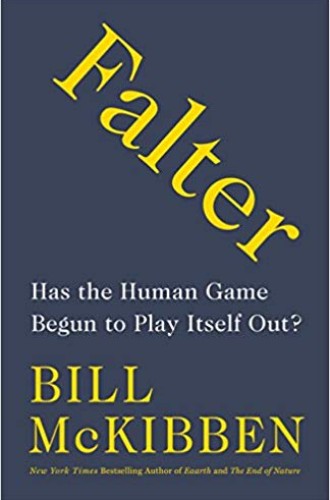Unrigging the human game
We need to stop playing to win, says Bill McKibben, and start playing to keep the game going.
In the past few years, I’ve increasingly found myself in conversations about technology and ethics. The topics range from how artificial intelligence is reshaping the labor market to what kinds of technology will help us sequester carbon to methods of augmenting human life to adapt to new climate realities. As I argue for restraint over ingenuity, an interlocutor will inevitably say, “You should read Steven Pinker. He’s an ethicist and he thinks the human condition is getting better. He even has proof.” Never mind that Steven Pinker is not an ethicist; the critique is clear: stop being so negative about the future. This is very much like telling an environmental ethicist to smile more.
Bill McKibben takes on Pinker’s narrative of human moral progress specifically as it applies to climate change. He does so with attention to psychology. People want to believe that things get better, that individual action matters, and that what we’ve done to the environment can be reversed. McKibben himself is a hopeful soul. He pivots off of Pinker’s blind optimism, acknowledging that Pinker’s books “remind us precisely how much we have to lose if our civilizations do indeed falter.” Rather than pushing us toward despair, McKibben situates his book as a call to action. Hope is a useful tool only if you know the shape of reality that you face. McKibben gives us the environmental and political shape of reality in stark terms.
Read our latest issue or browse back issues.
McKibben refers to human life as a game, one that encompasses culture, commerce, politics, religion, sport, art, social life, and all human experience. It involves the coordination of natural and social resources to meet human needs at every level. Going to an orchestra concert, for example, represents a pinnacle of human cooperation and the reshaping of natural goods. Beyond the beautiful music that is made by people working together, there’s also the cutting of trees for wood, the shaping of the wood into instruments, the teaching of music broadly, the teaching of specific musical traditions, the transportation of the instruments, the transportation of the people, and more. And behind each of these actions lies even more detailed kinds of cooperation.
This human game has long been stable, but McKibben warns that it is now endangered because humans have become a global “destructive geologic force.” For McKibben, the metaphor of game does not imply low stakes or winners and losers. “I call it a game because it has no obvious end.” He suggests that the game is going well when human dignity is broadly increased and poorly when it is broadly decreased. As Falter proceeds, it becomes clear that not all players share this assessment. Rather than playing with the goal of keeping the shuttle in the air or the game going for everyone, some players are playing to win and will spike the shuttle to do so.
The threat to our shared life comes from two pressing problems: climate change and biotechnology. These threats are not unrelated. In the second section of his book, McKibben seems to be channeling the philosopher Hans Jonas. McKibben, like Jonas, is concerned about how changing the planet will change people.
Will we be able to interpret the past if we cannot recognize the humans that came before us? The cultivation of empathy and fellow feeling currently makes this possible, as well as our biological similarity to past humans. While we may have progressed in some ways that Pinker highlights—more humans can feed themselves now than two centuries ago—we are biologically the same. That sameness is essential to interpreting the past and also to understanding our peers in the present. That sameness is threatened by the movement toward genetic engineering and the rise of artificial intelligence.
Climate change affects the human game more directly than the human body, but the body doesn’t escape damage. We are constantly breathing in chemicals that can alter our physiology. Those changes are still minor and slow compared to the impact of the emerging science of gene editing. Gene editing will change the species in one to two generations because the changes will be heritable. McKibben relates his conversations with many biotechnology entrepreneurs. Once CRISPR-Cas9 has been adopted for germ line editing, the game is up. Parents with the means to do so will be able to select traits for their children that will consolidate social, economic, and genetic advantage in one group of people. The only way for the human game as we know it to continue is by regulating this new technology.
McKibben yokes artificial intelligence (AI) to biotechnology due to the geographical proximity of the research and the psychological overlap. He sees in the extremes of each movement a drive to escape death and a reliance on technology to do so. In fact, much of our optimism that we can think ourselves out of the crisis of climate change relies on setting up technology as a savior. And much of this optimism is based on humans overcoming our bodily needs and limitations. The problems of climate change, gene editing, and AI are part of a feedback loop fueled by individualism and the desire to escape death.
One of the most novel aspects of Falter is McKibben’s tracing of the development of libertarian political thought in America which has led us to this moment. He situates Ayn Rand as a primary figure, admired both by traditional business leaders like the billionaire Koch brothers and by the technology innovators in Silicon Valley. Both groups pit human freedom against government regulation. Along the way, McKibben shows how the Kochs and their ideological allies have rigged the game in favor of the wealthy. This historical use of capitalism is the paradigm for the potential future rigging of the game through biotechnology and AI. Inequality begets more inequality.
While McKibben distances himself from Pinker, he does end on a hopeful note. The two “technologies” that McKibben thinks we should focus on are solar panels and “resistance”—a nonviolent popular movement to resist the forces degrading the planet and human life. Solar panels are a means of democratizing access to energy. Once they are in place, the energy from the sun is free. A shift to renewable energy will level the playing field for billions of people. Resistance is not traditionally regarded as a technology, but McKibben argues that it is a uniquely human practice. Moreover, it relies on the deeper human truth of connection and social relationship rather than the idolatry of individualism to achieve its ends.
And what of religion? What is its role in the human game? McKibben gestures toward the role of religion in bringing people together around common purposes, and he notes that religion has often led to greater equality among people. In the end, he leaves it up to the reader to decide what the best way is to level the playing field.







